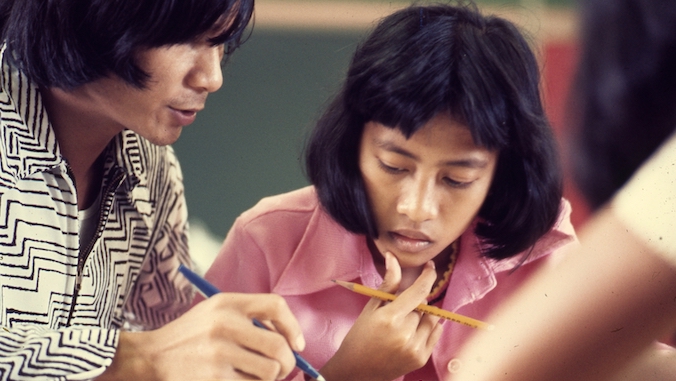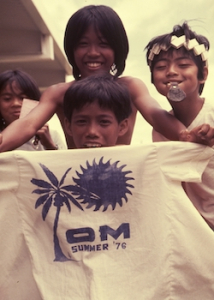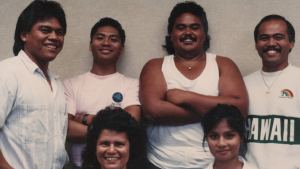
The first University of Hawaiʻi program to address campus diversity and equal access to higher education celebrated its 50th anniversary in November, with nearly 200 alumni attending the celebration event at the Filipino Community Center.
Operation Manong (OM), now called the Office of Multicultural Student Services (OMSS) at UH Mānoa, has touched the lives of thousands of underrepresented students in Hawaiʻi who faced social, economic and educational challenges, and helped them to become successful in college (and life) through its programming and activities. The program has provided assistance with undergraduate studies and mentorship, awarded scholarships, and trained future community leaders.
Supporting Filipino immigrant students

Fifty years ago, OM was co-directed by three UH Mānoa faculty and graduate students who were educated in the Philippines and at UH—Amefil “Amy” Agbayani (political science), Sheila Forman (psychology) and Melinda Tria Kerkvliet (history). They helped create OM with students and community members with the intent to tutor and mentor newly arrived Filipino immigrant students who were often harassed and misunderstood in Hawaiʻi’s public schools.
“None of us come from an education background, but all of us wanted to do something/anything to support these students to make their Hawaiʻi transition smoother and help them become successful in college” said Agbayani, emeritus assistant vice chancellor of the Office of Student Equity, Excellence and Diversity (SEED), who retired in 2016 and dedicated her life to creating opportunities for underrepresented students.
An Ilokano term of respect for someone older than you, “manong” was used by non-Filipinos in a derogatory way for a long time in Hawaiʻi.
“Operation Manong reflects the positive designation of ‘manong’ (older brother) or ‘manang’ (older sister) for respect and to build a better understanding among the younger generation of Filipinos in Hawaiʻi,” Agbayani said.
Expanding support for underrepresented students
Over the years, OM developed extensive community outreach programs and services for public school and high school students, and expanded its support to include Native Hawaiian, Pacific Islander and other student groups who were underrepresented at UH Mānoa.
One of those students was UH alumnus Leon Florendo, who was with OM as a community college transfer program participant and a tutor/mentor from 1988 to 1991. Born and raised on the Waiʻanae coast, he was the youngest of five children and the only one who went to college. Florendo was a Leeward Community College student who then transferred to UH Mānoa. He is now a Leeward CC associate professor and counselor with the Waiʻanae Moku Education Center, giving back to his community.

The psychology major put into practice what he learned in class, while learning more about himself in the process.
“I was manong to younger students in the program and at the same time, I embraced who I was as a Filipino/Samoan from Waiʻanae. I met and networked with other Filipino professionals at UH and became part of community organizations such as Sariling Gawa Youth Council, Kalihi YMCA, etc.,” he said.
OM’s outreach initiatives included recruitment activities, conducting campus-based summer programs and addressing other issues identified by communities that hindered students’ education (e.g., youth gangs and substance abuse).
“In all these activities, UH Mānoa students were involved not only in implementing the activities, but also in planning and coordinating them,” said Clement Bautista, former director of the Office of Multicultural Student Services, who retired in 2020.
Helping shape futures
Florendo said OM helped him every step of the way in his college journey. “I never felt alone or unsupported. There was always a manong or manang to help me with whatever challenges or difficulties I was experiencing at that time,” he said.
Operation Manong contributed to who I am today and for that I am extremely grateful.
—Leon Florendo
Florendo has been a counselor with the UH System for the past 22 years (14 years at Honolulu CC, eight years with Leeward CC). Now a Kaimukī resident, he happily drives 73 miles to work to assist students in his home town with their college journeys.
“Operation Manong contributed to who I am today and for that I am extremely grateful,” he said.
In recent years with budget restraints and new Department of Education policies, OM/OMSS programming has shifted more to campus-based activities, including coordinating campus tours for public and visiting international schools. The Hawaiʻi Undergraduate Initiative, a summer program for incoming UH Mānoa freshmen to make a smooth transition to college, is an example of one successful program that branched out of OM.
Nonetheless, “Fifty years ago and today, OM/OMSS still values education success, equity, diversity and inclusion,” Agbayani said.
—By Arlene Abiang

